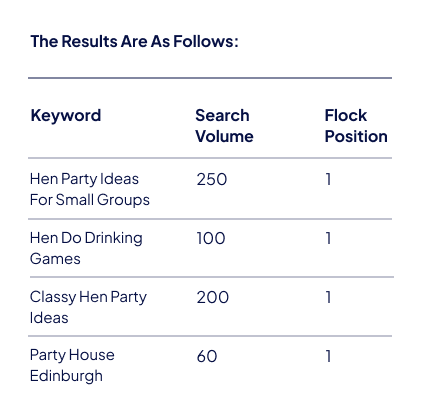
Search engine optimization (SEO) is one of the travel industry’s biggest untapped marketing opportunities.
61% of travelers use search engines to research and book holidays and most of these people will click on one of the top results. Ranking high in search results is critical if you want these potential travelers to visit your website and convert into customers.
Yet despite this, very few travel companies invest in SEO. 😕
This is because the top spots are often held by big names like Trip Advisor, Booking.com or Expedia. Many travel companies assume it’s impossible to rank number one on Google and so focus on other strategies.
And this creates a huge opportunity.
The truth is that independent websites can outrank industry giants. And because most travel sites don’t invest in SEO, even small efforts can have a significant impact.
Do it correctly and you can quickly generate long-term, sustainable traffic, leading to consistent bookings. This page explains how you can use SEO content to build a high-quality pipeline of bookings without paying huge referral fees to OTAs.
Why Kalium?
We’ve created and carried out SEO campaigns for travel companies with global reach – and helped them achieve incredible results.
For example, we helped bachelorette party planners Flock gain an average of 10-15 leads per month from organic search.
We did this by ensuring the ranked in the top 3 for 74 keywords.
This increased its monthly traffic by 437% in just one year and saw the value of its traffic jump from $148 to $568 per month.

The travel industry is perfect for SEO because of the huge demand for information. Let’s use African safaris as an example. Many tourists from North America or Europe only book one safari in their lifetime, so their knowledge is poor.
They need information on everything, including:
The cost
The options available
Which country to visit
When to go
Which company to use
Attract relevant search traffic,
both now and in the future
Position your brand as a
trusted authority
Convert casual researchers
into paying customers

As mentioned earlier, most travel companies assume they can’t outrank the big names in the industry.
Brands like Trip Advisor and Booking.com have high authority scores, which makes it easier for them to rank high for relevant search terms.
But we’ve repeatedly proven that it’s possible to beat these websites.
In the example below, our client Flock has beaten a competitor to the top spot.
What makes this exciting is that Flock is a relatively new company. It has a low authority score (listed here as DR) of 7 but has beaten a DR 81 website to the top spot (that’s high!).
Share your expertise and authority
Monetize your content
Publish genuinely useful content
Many people assume SEO involves lots of secret tricks and hacks. But Google makes it clear to webmasters what it wants—and it’s simple.
In a recent algorithm update the company stated:
This update is designed to continue our work to improve the quality of our search results by showing more content that people find genuinely useful and less content that feels like it was made just to perform well on Search. As always, we aim to connect people with a range of high quality sites, including small or independent sites that are creating useful, original content, when relevant to users’ searches.
In other words, what matters is:
Create content that answers people’s questions clearly and comprehensively. Optimizing for search engines is important but should always come second.
The quality of your website and its content matters. It should be professionally
produced and use a range of media,
including images, videos, and text.
Focus on questions that are relevant to your expertise. For example, if you run an African safari travel company, you’re more likely to rank for “best Cape Town safaris” than you are “best places to eat in Cape Town”.
What matters less is the size of your website. Google wants to rank small and independent sites alongside industry behemoths.
Share your expertise and authority
The emergence of AI means it’s easier than ever to create content. But this content isn’t necessarily good. With AI, anyone can write about any subject.
As a result, Google is inundated with poor quality, thin content. To combat this, the search engine has launched guidelines that it uses to evaluate the quality of content.
They are:
Experience
Your business probably already meets all of these criteria—they just need to be reflected in your content.
Monetize your content
Because your business already meets EEAT requirements, the hard work has already been done.
Your years of industry insight, opinions and deep knowledge will be invaluable for people searching online.
You need only create content regularly based on what you know and start attracting traffic.
But attracting traffic to your website is only one half of the story.
You also need to guide visitors to the next step in their customer journey. This could involve:
Fulfill these three areas, and your SEO efforts will generate consistent, high-intent website traffic.

You might be thinking, “I don’t need SEO. I use PPC ads, so I appear above the first result.”
That’s true, but PPC ads target a different kind of customer. Users know that Google’s sponsored links are trying to sell them something.
That’s fine if they’re ready to buy—but not if they’re at the research stage, seeking unbiased information.
An effective search marketing campaign combines SEO and PPC to capture users at different stages of the customer journey.
By now, you’re probably convinced of the incredible opportunities that SEO offers travel companies. In the next section we’ll explain how you can make creating all of that content a reality.
Google prefers to rank websites that post regularly. The question is, how can you produce professional on a weekly basis?
There are three options: 👇
Do it yourself: You’ll have complete control, but you’ll have to learn SEO and invest A LOT of time in producing content. Who has time for that?
Hire an in-house team: You’ll have a team dedicated to writing your content. The downside is that it’s high risk. You’ll spend lots of money on recruitment, staffing, and buying SEO tools, but there is no guarantee of success.
Hire an experienced agency: This way, you get an entire team of SEO experts for a fraction of the cost of hiring. Their broad experience means they know which SEO strategies will be most effective—they can almost guarantee success.

If using an SEO agency sounds like the right option for you, then you need Kalium. Our team has helped travel companies around the world generate relevant traffic and increase sales.
We handle every stage of the SEO process, including:
Strategy
Content Production
Technical SEO
recommendations
Reporting
Flock is a bespoke bachelorette party planner based in the UK (they call it a “hen do” over there).
Its customers use search engines to find information on planning these events.
We helped them achieve this by publishing reliable, informative content that highlights Flock’s unique services.
As a result, the company now ranks in the top spots for high-intent keywords.
Don’t believe us? Just try typing these terms into Google.


Look at how the company’s traffic has spiked (and continues to) after working with us for just a couple of years.
Want to Achieve the Same Results?
Then book a call today. We’ll guide you through a discovery session to understand your business goals and explain how our SEO content can help achieve them.
We’ll guide you through a discovery session to understand your business goals and explain how our SEO content can help achieve them.
Agree an SEO strategy: Explaining what our campaigns will aim to achieve and how we’ll do it.
Perform keyword research: We’ll analyze Google search results to find the best opportunities to drive traffic to your site.
Create a content calendar: We’ll create and fully manage a content creation campaign, with regular publishing deadlines.
Create content: Our skilled SEO writers will get to work creating high quality content. You need to provide us with your expertise and review articles.
Reporting: We’ll keep you updated on progress so you can see the impact SEO is having on your traffic.
